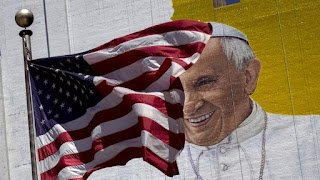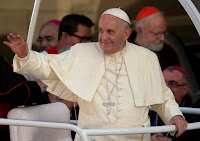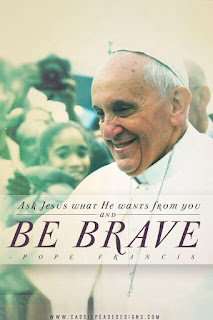
As I get closer to the Big Day (wedding's only a few weeks away!) I am struck more profoundly on a daily basis just what a tall order it is to be a husband and, God willing one day, a father. We live in a world that seems to have completely lost its azimuth when it comes to following the direction God designed us to follow. The Catholic Church has always held up two beautiful, holy, challenging vocations to which God calls men. They are very distinct, yet they are complementary and both very necessary for advancing the Gospel. They are, of course, the Priesthood and Holy Matrimony. Both vocations demand that the parties entering into them give not just of their earthly treasure and time in some kind of contractual agreement. They demand our entire lives. Ordination to the priesthood and entrance into the married life are covenants, not contracts. They are not exchanges of goods and services, they are exchanges of persons. They are not based on feelings, emotions, potentially prosperous lifestyles, self-assertion, or even strong attraction. They are completely based on love. Love is sacrifice. Love is doing whatever is best for the beloved's sake, especially the beloved's soul.
 For the priest, he gives his life entirely to God in service of Christ's Bride, the Church. The Church truly becomes the bride of the ordained priest. He is entirely for Her in all places, all settings, all times. He is never "off duty." Likewise, for the married man, his commitment to his wife and to the children God may send them can never be something he hangs up at the end of the night like a grilling apron. He himself is theirs, he is not his own. This is the Church's understanding of marriage and the priesthood precisely because they are images of God's spousal love for the human race. Look no further than the crucifix if you want a rather brutal summary of how unthinkable the notion of just giving us some of His love was to God the Father. He gives every last drop of blood to save us. He sacrifices everything He is for our own good. That's the model - a better one just does not exist.
For the priest, he gives his life entirely to God in service of Christ's Bride, the Church. The Church truly becomes the bride of the ordained priest. He is entirely for Her in all places, all settings, all times. He is never "off duty." Likewise, for the married man, his commitment to his wife and to the children God may send them can never be something he hangs up at the end of the night like a grilling apron. He himself is theirs, he is not his own. This is the Church's understanding of marriage and the priesthood precisely because they are images of God's spousal love for the human race. Look no further than the crucifix if you want a rather brutal summary of how unthinkable the notion of just giving us some of His love was to God the Father. He gives every last drop of blood to save us. He sacrifices everything He is for our own good. That's the model - a better one just does not exist.
Next to Mary, I don't think anyone ever lived with that kind of love to a greater extent than Saint Joseph. A fallen man, he was the one that the Father chose from all eternity to be his very representative in the human life of His Son. Joseph was, in a very profound way, the face of God the Father to the Christ Child. He protected him from harm, hid him from adversaries, traveled day and night through heat, dust, sand, wind. Joseph never, never stopped loving and serving Mary and Jesus. We have no record of him saying so much as one word in all of the New Testament. He just sought out the will of God, and he did it the best he could. He prayed. He worked. He didn't complain. He absolutely spent himself in devotion to Our Lord and Our Blessed Mother.

I can't think of a better model for me to emulate as I stand on the threshold of married life. In a time like never before, when the Church's beautiful, God-given image of marriage is being assaulted from every possible angle, we all need Saint Joseph. Priests as well as husbands and fathers need to humbly call out to Saint Joseph and ask for his intercession, his protection, and his guidance along the path that will require us to give everything away for the sake of our bride and our family. Indeed, it will require our very lives.
O Saint Joseph, patron of husbands and fathers, pray for us.
O Saint Joseph, patron of those who labor and those who seek labor, pray for us.
O Saint Joseph, patron and protector of the Church, pray for us.
O Saint Joseph, patron of departing souls, pray for us.












